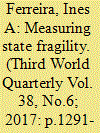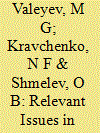|
|
|
Sort Order |
|
|
|
Items / Page
|
|
|
|
|
|
|
| Srl | Item |
| 1 |
ID:
169857


|
|
|
|
|
| Summary/Abstract |
Solid tests of the impact of environmental and energy policy on important economic outcomes, such as innovation, productivity, competitiveness and energy and carbon efficiency are impaired by the lack of appropriate empirical proxies for the commitment to, and stringency of, environmental policy. We contribute to the literature by: (1) computing different indicators of environmental policy stringency, (2) testing to what extent they convey similar insights through a statistical comparison exercise, and (3) showing the implications of using one or the other indicator in two illustrative empirical applications focused on environmental innovation and energy efficiency. We conclude by highlighting the implications of our analysis for empirical research focusing on the evaluation of policy impacts, and highlight fruitful future research avenues.
|
|
|
|
|
|
|
|
|
|
|
|
|
|
|
|
| 2 |
ID:
152795


|
|
|
|
|
| Summary/Abstract |
State fragility has become a resonant term in the development discourse over the past decade. In its early days it served as a catch-all phrase used by donor organisations to draw attention to the need to assist ‘fragile states’. In response to the call for a better understanding of how to deal with these countries, there was a surge in measures of fragility. However, it was not long before academics pointed to the murkiness and fuzziness of the term, and identified several caveats to most of the proposals for quantification. This paper reviews existing approaches to operationalise this concept, distinguishing between those that offer no ranking or only partial rankings of fragile states, and those providing ordinal lists of countries. The examination of their theoretical underpinnings lends support to the critical view that most existing approaches are undermined by a lack of solid theoretical foundations, which leads to confusion between causes, symptoms and outcomes of state fragility.
|
|
|
|
|
|
|
|
|
|
|
|
|
|
|
|
| 3 |
ID:
156137


|
|
|
|
|
| Summary/Abstract |
This paper examines issues of techniques and factor analysis in research in general and in military history research in particular, which determine the functioning conditions for the phenomenon or process under examination.
|
|
|
|
|
|
|
|
|
|
|
|
|
|
|
|
| 4 |
ID:
115105


|
|
|
|
|
| Publication |
2012.
|
| Summary/Abstract |
As it has long been debated who is a front-runner and who is a laggard state in terms of environmental protection it is rather surprising that the topic has received rather scant attention as far as quantitative, large-n research endeavours are concerned. Of course, there is a broad literature on the topic. However, existing studies have shortcomings. The criteria on which the assessments rely are often neither equivalent cross-nationally nor are they communicated clearly enough (i.e., not transparent). Although ambitious efforts have been invested to rank countries in terms of their environmental performance, little systematic research exists that clearly determines leaders and laggards in terms of their policies (policy performance) and states' ranking, accordingly.
To the best of our knowledge no empirical study has so far conducted a comprehensive and quantitative leader-laggard assessment policy analysis. Against this backdrop, we aim to provide such a paper. We especially strive to test the validity of "common knowledge" classifications or rankings derived from assessments in the literature.
We demonstrate that while some known frontrunner states are indeed leaders if assessed from a broader policy data perspective, other countries commonly assigned a leader role find themselves in a lower position instead. In addition, some nations commonly excluded from the frontrunners are located unexpectedly high in the rankings. Even leader-laggard reversals occur if our results would be compared to existing classifications. Most importantly, the analyses show a considerable temporal dynamic. While often claimed or assumed, this has not been proven as clearly until now.
|
|
|
|
|
|
|
|
|
|
|
|
|
|
|
|
| 5 |
ID:
179224


|
|
|
|
|
| Summary/Abstract |
This paper outlines the main problems in the formation of the initial data system covering RF AF facilities, economy, and infrastructure in the interests of organizing aerospace defense, and the methodological approaches to resolving these problems.
|
|
|
|
|
|
|
|
|
|
|
|
|
|
|
|
|
|
|
|
|